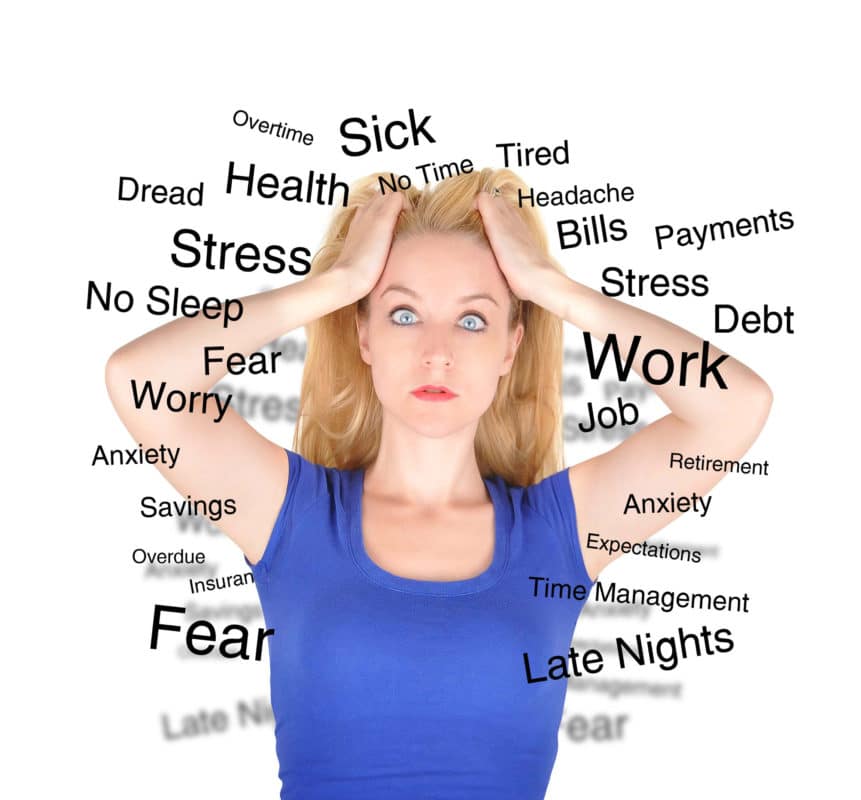Relieve Stress and Anxiety
Chronic Stress: Take Steps To Control Your Stress
In this article, you’ll learn and discover how to control your stress or chronic stress in your life.
Your body is hard-wired to react to stress in ways meant to protect you against threats from predators and other aggressors. Such threats are rare today, but that doesn’t mean that life is free of stress.
On the contrary, you undoubtedly face multiple demands each day, such as shouldering a huge workload, making ends meet and taking care of your family. Your body treats these so-called minor hassles as threats. As a result, you may feel as if you’re constantly under assault. But you can fight back. You don’t have to let stress control your life.
What is natural stress?
When you encounter a perceived threat — someone suspicious starts following you during your afternoon walk, for instance — your hypothalamus, a tiny region at the base of your brain, sets off an alarm system in your body. Through a combination of nerve and hormonal signals, this system prompts your adrenal glands, located atop your kidneys, to release a surge of hormones, including adrenaline and cortisol.
Adrenaline increases your heart rate, elevates your blood pressure and boosts energy supplies. Cortisol, the primary stress hormone, increases sugars (glucose) in the bloodstream, enhances your brain’s use of glucose and increases the availability of substances that repair tissues.
Cortisol also curbs functions that would be nonessential or detrimental in a fight-or-flight situation. It alters immune system responses and suppresses the digestive system, the reproductive system, and growth processes. This complex natural alarm system also communicates with regions of your brain that control mood, motivation, and fear.
When the natural stress goes out of control
The body’s stress-response system is usually self-limiting. Once a perceived threat has passed, hormone levels return to normal. As adrenaline and cortisol levels drop, your heart rate and blood pressure return to baseline levels and other systems resume their regular activities.
But when stressors are always present and you constantly feel under attack, that fight-or-flight reaction stays turned on.
The long-term activation of the stress-response system — and the subsequent overexposure to cortisol and other stress hormones — can disrupt almost all your body’s processes. This puts you at increased risk of numerous health problems, including:
- Anxiety
- Depression
- Digestive problems
- Headaches
- Heart disease
- Sleep problems
- Weight gain
- Memory and concentration impairment
That’s why it’s so important to learn healthy ways to cope with the stressors in your life.
4 Quick tips to beating stress
Mediate
People who practiced Buddhist meditation significantly decreased both cortisol and blood pressure in a 6-week Thai study. Similarly, participants who meditated daily for four months decreased the hormone by an average of 20% in a study at Maharishi University, while levels in the nonmeditating control group actually went up slightly.
Get a massage
A little pampering can rub your stress levels the right way. After several weeks of massage therapy, subjects’ cortisol levels decreased by nearly one-third, on average, according to studies at the University of Miami School of Medicine and elsewhere. In addition to keeping cortisol under control, massage sessions reduce stress by promoting the production of dopamine and serotonin, the same “feel good” hormones released when we socialize with pals or do something fun.
Hangout with a good friend
The “cup that cheers” has deep associations with comfort and calm—just think of how the English revere their late-afternoon teatime. As it turns out, science confirms the connection: When volunteers at University College London were given a stressful task, the cortisol levels of those who were regular black-tea drinkers fell by 47% within an hour of completing the assignment, while others who drank fake tea experienced only a 27% drop. Study author Andrew Steptoe, Ph.D., suspects that naturally occurring chemicals such as polyphenols and flavonoids may be responsible for tea’s calming effects.
Take a nap
What’s the difference between getting six hours of sleep instead of the suggested eight? Fifty percent more cortisol in the bloodstream. When a group of pilots slept six hours or less for seven nights while on duty, their cortisol levels increased significantly and stayed elevated for two days, found a study at Germany’s Institute for Aerospace Medicine. The recommended 8 hours of nightly shut-eye allows your body enough time to recover from the day’s stresses, Talbott says. When you fall short of the mark, take a nap the next day—Pennsylvania State University researchers found that a midday snooze cut cortisol levels in subjects who’d lost sleep the previous night.
Weekly Featured Products
References
- How stress affects your health. American Psychological Association. http://www.apa.org/helpcenter/stress.aspx. Accessed Feb. 12, 2016.
- Stress and your health. U.S. Department of Health and Human Services. http://www.womenshealth.gov/publications/our-publications/fact-sheet/stress-your-health.html. Accessed Feb. 12, 2016.
- Fight stress with healthy habits. American Heart Association. http://www.heart.org/HEARTORG/HealthyLiving/StressManagement/FightStressWithHealthyHabits/Fight-Stress-with-Healthy-Habits_UCM_307992_Article.jsp#.Vr5VAtj2bcs. Accessed Feb. 12, 2016.
- Coping with stress. Centers for Disease Control and Prevention. http://www.cdc.gov/Features/CopingWithStress/index.html. Accessed Feb. 12, 2016.
- Seaward BL. Essentials of Managing Stress. 3rd ed. Sudbury, Mass.: Jones & Bartlett Publishers; 2014.
- Seaward BL. Managing Stress: Principles and Strategies for Health and Well-Being. 7th ed. Sudbury, Mass.: Jones & Bartlett Publishers; 2012.
- Barbara Woodward Lips Patient Education Center. Stress management. Rochester, Minn.: Mayo Foundation for Medical Education and Research; 2004.
- Prevention
- Mayo Clinic










